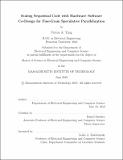Scaling sequential code with hardware-software co-design for fine-grain speculative parallelization
Author(s)
Ying, Victor A.
Download1124763431-MIT.pdf (989.3Kb)
Other Contributors
Massachusetts Institute of Technology. Department of Electrical Engineering and Computer Science.
Advisor
Daniel Sanchez.
Terms of use
Metadata
Show full item recordAbstract
Multicores are now ubiquitous, but most programmers still write sequential code. Speculative parallelization is an enticing approach to parallelize code while retaining the ease and simplicity of sequential programming, making parallelism pervasive. However, prior speculative parallelizing compilers and architectures achieved limited speedups due to high costs of recovering from misspeculation, limited support for fine-grain parallelism, and hardware scalability bottlenecks. We present SCC, a parallelizing compiler for sequential C/C++ programs. SCC targets the recent Swarm architecture, which exposes a flexible execution model, enables fine-grain speculative parallelism, supports locality and composition, and scales efficiently. SCC introduces novel compiler techniques to exploit Swarm's features and parallelize a broader range of applications than prior work. SCC performs whole-program fine-grain parallelization, breaking applications into many small tasks of tens of instructions each, and decouples the spawning of speculative tasks to enable cheap selective aborts. SCC exploits parallelism across function calls, loops, and loop nests; performs new transformations to expose more speculative parallelism enabled by Swarm's execution model; and exploits locality across fine-grain tasks. As a result, SCC speeds up seven SPEC CPU2006 benchmarks by gmean 6.7x and by up to 29x on 36 cores, over optimized serial code.
Description
This electronic version was submitted by the student author. The certified thesis is available in the Institute Archives and Special Collections. Thesis: S.M., Massachusetts Institute of Technology, Department of Electrical Engineering and Computer Science, 2019 Cataloged from PDF version of thesis. Includes bibliographical references (pages 51-55).
Date issued
2019Department
Massachusetts Institute of Technology. Department of Electrical Engineering and Computer SciencePublisher
Massachusetts Institute of Technology
Keywords
Electrical Engineering and Computer Science.